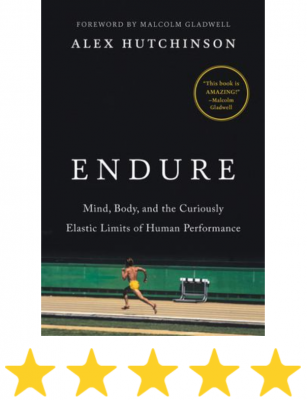Book Review: “Endure” by Alex Hutchinson — A Fitting Successor to “The Sports Gene” As the Next Great Sports Science Book
By Jonathan Gault
February 13, 2018
The scenario is one that has often been imagined. It’s the final mile of the Olympic marathon. Two runners are in a neck-and-neck battle for the gold medal. The finish line is rapidly approaching. They have been equals for the preceding 26 miles, but, over the final 385 yards, one of them makes a move the other cannot match.
 Endure gets our highest rating – 5 stars out of 5. Support LRC and purchase here.
Endure gets our highest rating – 5 stars out of 5. Support LRC and purchase here.
Usually, the winner is the biggest story. But in the new book that came out a week ago, Endure: Mind, Body, and the Curiously Elastic Limits of Human Performance, it’s the runner-up that author Alex Hutchinson is more interested in. What, exactly, caused him to lose? And is there a way that he could have pushed harder? After all, he is still alive — suggesting that his body did not exceed its physical limit.
These are the questions that drive Endure. And while, as Malcolm Gladwell points out in the foreword, “this is not a running book,” much of the knowledge contained within will be of interest to the LetsRun.com audience (plus, Pre is on the cover). Hutchinson, who used to write the “Sweat Science” column for Runner’s World and now is a writer for Outside magazine, weaves in details about his behind-the-scenes access to Eliud Kipchoge and Nike’s Breaking2 project. Plus Hutchinson was a very respectable runner in his own right, with a personal best of 3:42 for 1500 meters and two appearances in the 1500 final at the Canadian Olympic Trials.
Over 267 pages, Hutchinson — who holds a Ph.D. in Physics from Cambridge — does a terrific job of laying out what happens when the body is pushed to its limits and how, in some cases, those limits can be overcome. For instance, a Danish study of cyclists in the 1990s showed established a “critical” core temperature of 104 degrees Fahrenheit; once the body reached that temperature, each cyclist would inevitably quit. Yet other studies showed that positive self-talk could push that limit higher, as could the use of certain drugs, which seemed to alter the perception and internal regulation of heat. Hutchinson does the same thing for several other limiting factors — pain, muscle, oxygen, thirst, and fuel — first establishing the limits seemingly set by science before examining how to exceed those limits.
There’s also an interesting discussion on the differences of the body’s limits in different running events. Why can 5,000-meter runners summon a finishing kick — even in world-record races — while 800-meter runners cannot? Hutchinson argues that, in the shorter events, the limiting factor is muscular — the brain is trying to recruit all active muscle fibers to the task, but the muscles do not respond — while in the longer events, the limiting factor is the brain, allowing for a kick at the end (because, in a long-distance race, the brain may step in before the true muscular limit is reached).
There are also some terrific case studies, such the man who survived eight days in the Sonoran desert in 1905 with essentially zero water, and Ernest Shackleton, the famous Antarctic explorer who, after marching 820 miles toward the South Pole, decided to turn back 112 miles short of his goal, knowing that he and his team did not have the supplies to make it all the way to the Pole and back without perishing.
I won’t spoil any more of the book, but it’s filled with the sharp prose and detailed research readers of Hutchinson’s “Sweat Science” column have come to expect. Hutchinson is on a journey to discover the limits of endurance and all of the science behind them, and while he admits “I started out with the hunch that the brain would play a bigger role than generally acknowledged,” he doesn’t leap to conclusions. He has the self-assurance to admit when the science isn’t clear on something, trusting that the voyage is entertaining enough to keep the reader’s interest (it usually is).
Endure should fit comfortably next to The Sports Gene in the library of any fan of sports science. Five stars.
Other book reviews by LetsRun.com can be found here
You can buy Endure online (and support LetsRun.com in the process) here. We aren’t the only ones who like it. It currently has only 5 star reviews on amazon.


